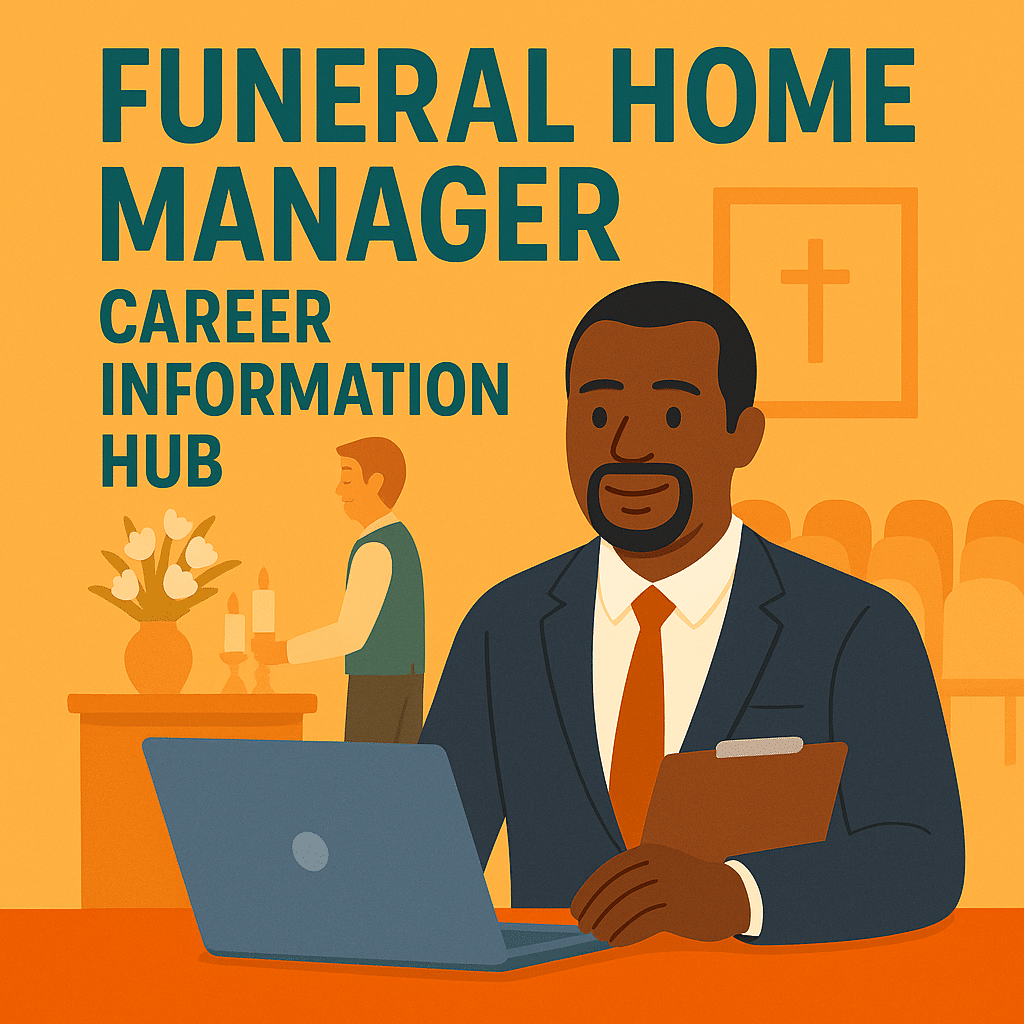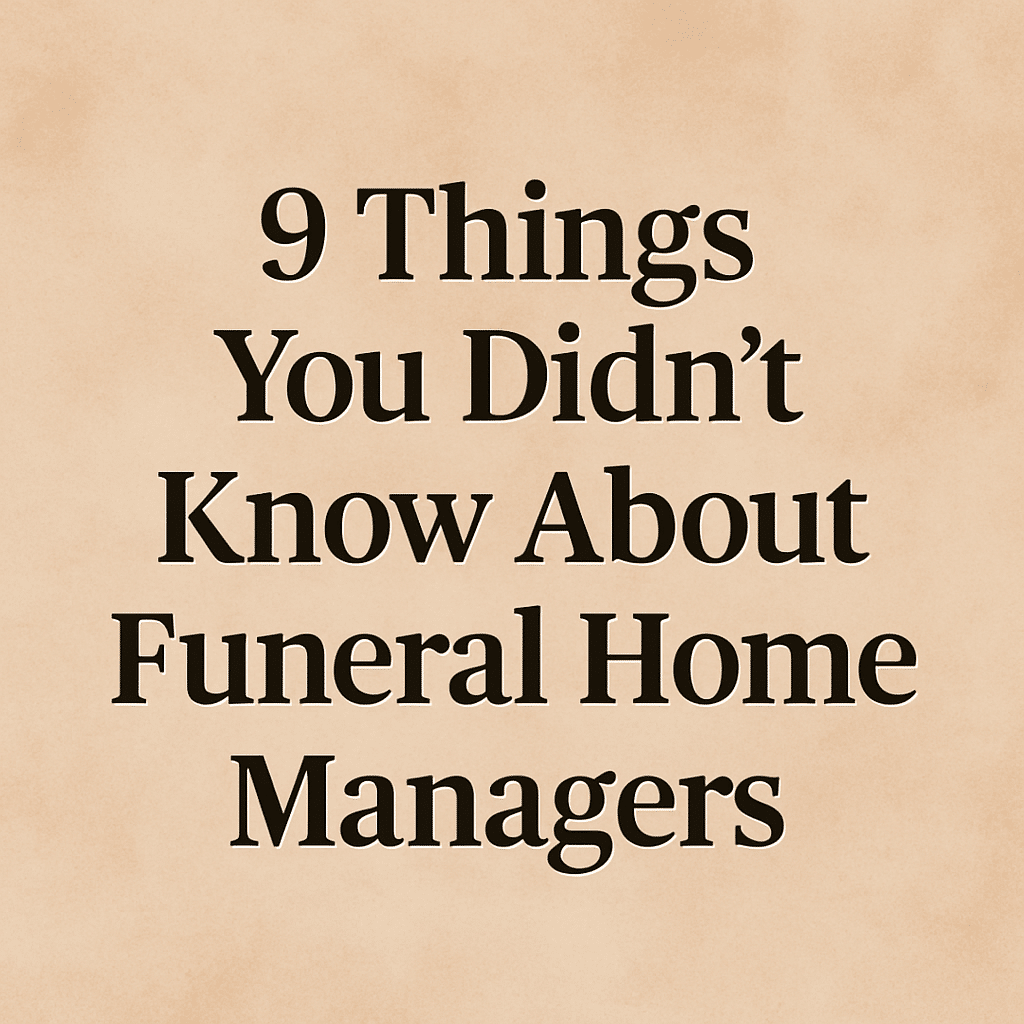The heartbeat of the funeral home
The Funeral Home Manager Career Information Hub
Funeral home managers are the steady hands behind every detail. From staffing and scheduling to working with grieving families, they ensure the entire experience is professional, respectful, and compassionate. If you have strong leadership skills and a heart for service, this role offers a rewarding way to make a meaningful impact.

Key Things To Know
Funeral home managers are the glue that holds operations, staff, and families together, often all in the same day.
Key Things to Know:
- Licensing is required for most managers: In most states, the official manager of a funeral home must be a licensed funeral director. Some larger firms may have unlicensed business managers, but they cannot supervise funeral services or sign legal documents.
- You’ll wear many hats: From overseeing services to managing employees and budgets, this role requires both heart and hustle.
- Leadership is essential: You’ll guide your team, resolve conflicts, and ensure that every family receives compassionate, professional care.
- Organization matters: Scheduling, supplies, staffing, and compliance all fall under your responsibilities.
- People skills are non-negotiable: You’ll be supporting families in crisis while also motivating and managing your staff.
- You set the tone: Your presence shapes how the team works together and how the public experiences the funeral home.
- Experience counts: Most funeral home managers work their way up from apprentice or funeral director roles, gaining insight at every level.
- Compliance is part of the job: You’ll be responsible for following local, state, and federal regulations, often while making sure your staff does too.
Why Choose This Career?
If you’re a natural leader who finds meaning in helping others during life’s hardest moments, this career offers purpose, stability, and impact.
Why Choose This Career?
- Lead with heart and purpose: You’ll oversee a team that provides essential support to grieving families, making sure every service runs smoothly and respectfully.
- You create stability: You make sure everything runs smoothly, even during emotionally charged moments.
- Make a difference behind the scenes: From training staff to ensuring quality care, your influence shapes every family’s experience.
- You keep tradition alive: Funeral homes are cornerstones of many communities, and you help preserve that role.
- Use your full skill set: This role combines emotional intelligence, operational management, customer service, and regulatory knowledge.
- Be part of a respected profession: Funeral home managers are trusted community figures who help bring calm and clarity during crisis.
- Opportunities for growth: With experience, you can own a funeral home, consult, or take on leadership roles in larger networks or associations.
- Job stability in a meaningful field: End-of-life care is a field that will always be needed, and strong managers are in demand.
Job Responsibilities
Funeral home managers oversee the daily operations of the funeral home while ensuring that families receive compassionate, professional care. This role blends leadership, logistics, and service.
- Supervise and support staff: Manage funeral directors, assistants, administrative teams, and part-time support, ensuring everyone performs their roles with professionalism and empathy.
- Coordinate services and schedules: Oversee daily operations, from booking facilities to managing service timelines and family meetings.
- Manage budgets and supplies: Handle financial planning, track expenses, order inventory, and ensure the facility runs efficiently.
- Ensure legal and regulatory compliance: Maintain all necessary licenses, records, and procedures in line with local, state, and federal laws.
- Maintain the facility: Oversee upkeep of service spaces, equipment, vehicles, and presentation to ensure a dignified environment.
- Meet with families as needed: Support client-facing roles by stepping in during high-demand times or handling complex family situations.
- Build community relationships: Represent the funeral home in the community and cultivate connections with hospice providers, clergy, and local leaders.
- Improve systems and service quality: Review processes and outcomes regularly to enhance the family experience and staff satisfaction.
Education and Certification Requirements
Most funeral home managers build their careers through hands-on experience, but education and licensure are essential along the way.
- Associate or bachelor’s degree required: Most states require a degree in mortuary science or funeral service from an accredited program. Some managers also hold degrees in business, communications, or psychology.
- State licensure is typically required: Most managers must be licensed funeral directors and/or embalmers, depending on state laws. This involves passing the National Board Exam and fulfilling any state-specific requirements.
- Apprenticeship comes first: A one- to two-year apprenticeship under a licensed funeral director is usually required before obtaining licensure.
- Continuing education may be required: Many states mandate regular CE credits to maintain your license and stay current on laws, ethics, and best practices.
- Business and leadership skills matter: While not required, coursework or certification in management, HR, or customer service can help you stand out and succeed.
- Professional association memberships help: Joining groups like the National Funeral Directors Association (NFDA) or state funeral boards can provide networking, mentorship, and resources.
How To Get Started
You don’t begin as a manager, but if this is your goal, there’s a clear path to get there.
- Start with mortuary science: Complete an accredited program to become a licensed funeral director.
- Gain experience on the floor: Work as a director or arranger to understand every aspect of the business.
- Seek mentorship: Learn from experienced managers who can guide your growth.
- Ask for leadership tasks: Volunteer to help with scheduling, staff training, or inventory to build experience.
- Study business skills: Take workshops or courses in finance, HR, or marketing to round out your toolkit.
- Know your state’s rules: Some states have specific regulations for managing a funeral establishment.
- Apply for promotion or ownership: Once you’re ready, look for leadership openings or plan to purchase or start your own firm.
Common Myths
People often misunderstand what a funeral home manager actually does. Let’s clear up a few things.
Myth: It’s just about funerals.
It’s about business, leadership, and people management too.
Myth: You have to own the business.
Many managers are employees of larger firms or family-owned businesses.
Myth: You only work with families.
Managers also work with vendors, regulators, staff, and community leaders.
Myth: You have to do everything yourself.
Good managers delegate, train, and build strong teams.
Myth: It is an emotionally heavy job every day.
It can be challenging, but it is also deeply rewarding and purpose-driven.
What Makes Someone A Good Fit
Being a strong funeral home manager takes both heart and backbone. Here are a few traits that help people thrive in this role.
- You are calm under pressure: You can handle challenges without losing your cool.
- You care about people and details: You are empathetic and precise at the same time.
- You are a strong communicator: You can talk with grieving families, lead team meetings, and write clearly.
- You take responsibility: You are comfortable being the person everyone turns to.
- You lead by example: You set the tone for your team through your own behavior.
- You are organized and focused: You can juggle multiple tasks without letting things slip.
- You enjoy mentoring others: You like seeing your team grow and succeed.
Articles
Frequently Asked Questions
Here are answers to a few common questions about managing a funeral home.
Disclaimer: The information provided on this website and by Buried in Work is for general informational purposes only and should not be considered legal advice. Please consult with a qualified attorney or subject matter expert for advice specific to your situation.

